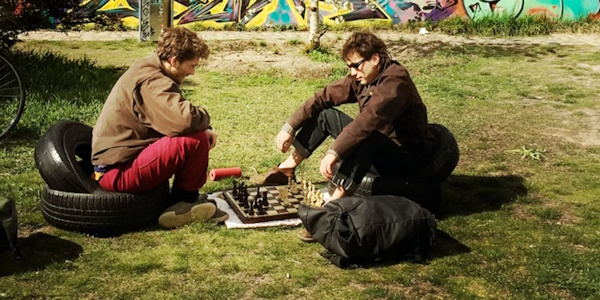Autistic and non-autistic people see the social world differently. But openness and empathy can foster a valuable bond
by Abby Sesterka & Erin Bulluss
Need to know
You’ve probably seen a film or television show where an Autistic person is portrayed as a loner. And, while media representations aren’t always realistic, perhaps you have met someone like this in real life: they might be a colleague who avoids office social functions, a student who regularly eats lunch in the library, or an acquaintance who usually declines invitations to parties. Often non-autistic people mistake this choice to opt out of certain social situations for a disinterest in social connection, or even take it as a personal rejection. This can make it hard to know when, how or whether to approach the person, which can limit opportunities to connect and develop a meaningful friendship.
Differences in social interaction and communication are among the defining features of autism – a lifelong developmental divergence that is also characterised by differences in sensory processing, and often accompanied by a preference for sameness and a capacity for hyperfocus. Historically, social behaviours such as those described above have been framed in terms of pathology. ‘Deficits’ in social communication and interaction form one of the two key groupings of diagnostic criteria for autism spectrum disorder (ASD) in the latest edition of the Diagnostic and Statistical Manual of Mental Disorders (2013), or DSM-5. But it is not always the case that Autistic people want to avoid social engagement; rather, research shows, different ways of engaging are important to consider. Recent studies that examine social interaction in cross-neurotype dyads – that is, pairings of Autistic people, pairings of non-autistic people, and pairings of an Autistic person and a non-autistic person – have shown that Autistic people are often more motivated and at ease when interacting with other Autistic people, and experience a greater sense of belonging.
That said, worthwhile friendships can develop between Autistic and non-autistic people, provided there is sufficient understanding and genuine acceptance of the distinct ways in which each person experiences the world.
A growing body of research that attends to the lived experience of Autistic people encourages us to reframe the way we view Autistic social interaction. Rather than focusing on deficits, we can think seriously about the differences in social-communicative style, preferences and needs that are core to the experience of autism. Autistic people often enjoy a different quality, type or frequency of social interaction compared with non-autistic people. For Autistic people, as for most people, healthy friendships are underpinned by respect, care and empathy; these might just manifest in different ways. This divergence from the norm can make initiating and sustaining friendships more challenging for Autistic people, given that social conventions are largely tailored to non-autistic people.
These ideas are linked to a concept called the ‘double empathy problem’, proposed in 2012 by the Autistic academic Damian Milton. The fundamental basis of the double empathy problem is that Autistic and non-autistic people have such different experiences of the world that establishing common ground is equally challenging for both parties. Milton defined it as a ‘double problem’ because it is experienced by both people and, thus, the problem belongs no more to one than it does to the other. This challenges the dominant view that it is the Autistic person who is impaired and, by default, responsible for any miscommunication or interpersonal challenges during interactions.
When all is said and done, building a friendship with an Autistic person is essentially the same as developing any other healthy relationship: based on mutual understanding and connecting in meaningful ways to create a sense of intimacy, trust and security. If you are non-autistic and haven’t yet had the opportunity to learn about Autistic ways of experiencing the world, some aspects of the process of developing a friendship with an Autistic person might seem a little foreign or confronting. But rest assured, Autistic people have many great qualities to bring to friendship; we tend to be honest, open and extremely loyal, and we have distinctive perspectives to offer. It is well worth persisting past any initial awkwardness to see if there might be solid friendship material hiding underneath.
In this Guide, we describe ways that non-autistic people can play their part in bridging the gap between different styles of social engagement in a friendship with an Autistic person. We’ve also included some notes on friendship for Autistic readers. As late-diagnosed Autistic women ourselves, we have had many friendship experiences throughout our lives – good, bad and sometimes confusing – and we draw from these experiences in offering our guidance.Before we sally forth to discuss the practical aspects of friendship, we’d like to add a caveat. ‘Autistic’ is not a one-size-fits-all descriptor, and there is immense diversity within the Autistic community. At certain points, you might think: ‘But this doesn’t apply to the Autistic person I know!’ and that might be true. We suggest disengaging, when necessary, from the more specific details and examples, and considering how the broader concepts discussed could apply.
Note: you’ll notice that throughout this article we use identity-first language (eg, ‘Autistic person’) in preference to person-first language (eg, ‘person with autism’). This is both a personal and political statement, and is reflective of our own preferences for how to describe our identity as well as the dominant preference of Autistic adults in Australia, where we live and work. We also choose to capitalise the word ‘Autistic’ – as you might have seen within the Deaf community – to denote pride.
What to do
Get to know your friend’s preferences
People are often guided by their own preferences for social connection when interacting with friends, as per ‘the golden rule’: do unto others as you would have them do unto you. However, when your friend is Autistic, they might have different preferences regarding the types and frequency of social contact and the kinds of gestures that they feel strengthen a friendship. Using your own preferences as a template can thus lead to misunderstandings.
Luckily, the solution is simply to ask your friend what they enjoy and don’t enjoy about social interaction, and to explore together what fosters feelings of connectedness and comfort in the friendship. For example, Autistic communication tends to be open, direct and honest, and we often prefer to skip the small talk about weather or local sporting teams, and instead get straight to the point. While this might come across as rude to some, it is really about getting to the interesting content, which is where we find connection with others. Note that remaining open and interested in learning about an Autistic person’s social preferences over time can help create a strong friendship, whether or not that person is able to readily articulate those preferences.
Learning about an Autistic person’s preferences can also include learning about the ways in which Autistic people experience the world differently from you, which underpins some of those preferences. You might like to ask your friend directly about this, and perhaps also read some accounts by other Autistic people to gain a greater understanding of the areas – such as sensory, emotional and language processing – in which our perception of ourselves, other people and the world is likely to differ from yours. Just remember that there is diversity among Autistic people, so refrain from assuming someone else’s experience is the same as your friend’s experience.
In line with a preference for predictability and sameness, which is common among Autistic people, both authors feel more comfortable socialising in familiar spaces where we know what to expect. When we socialise together, the inviter will make sure the invitee knows what the plans are (even down to the food that will be served) and who else will be there. Likewise, the invitee will mention if they are bringing a partner or if they might be running late. These are simple things, but it means we needn’t be concerned with the unknown and can better focus on enjoying time together.
Most often, we socialise at home, where noise and other sensory stimuli can be managed so as to allow us to concentrate on connecting with our friends. This is related to the sensory processing differences that are often a part of the Autistic experience. While for many people, the clanging of cutlery and hissing of steaming coffee machines might blend into the background as their minds naturally centre human voices, we find that these sounds can drown out conversations and put our nervous systems on edge, making for a rather unpleasant experience.
Be ready for (sometimes brutal) honesty
When we were young, undiagnosed Autistic women, carefully observing the social conventions of non-autistic people was a survival mechanism: it gave us a template on which to base our social interactions. These days, it’s more of a hobby. Many of these conventions are quite hilarious when you look at them critically.
We’ve all seen a friend, colleague or relative arrive with a new, utterly dreadful haircut. It’s so terrible, yet so noticeable that people can’t not comment on it. What commonly ensues is not frank feedback or constructive criticism, but rather a mass fawning over the unfortunate individual. They’re told that the new hairdo makes them look younger, or matches their face shape, or makes them look just like [insert name of current tabloid celeb]. As this unfolds, it seems obvious that everyone is passing deliberate and disingenuous comment to ease the palpable shared discomfort about the new haircut.
Speaking personally, that’s just not how we roll. While both of us are mindful of people’s feelings and respectful of differences in preferences, we refrain from giving positive comments unless we genuinely believe them. We will also express unpopular opinions, let our friends know directly when we disagree, and give a correction when it is warranted. This is largely because we – like many Autistic people – have a drive for truth over social niceties and value doing the right thing over adherence to social convention. We would feel it rude if our friends allowed us to continue to mispronounce a word or get the same terrible haircut again because of a lack of honest feedback. We are the people who will immediately tell you when you have parsley stuck between your teeth, saving you the retrospective cringe of getting home, looking in the mirror and realising that, for seven hours or so, people have politely observed your well-garnished dentition without saying a word.
So, if your Autistic friend hangs back quietly while others rave about your new haircut, or provides unsolicited fact-correcting during conversations, try not to take it personally. It comes free of subtext, power play or contempt, and is instead a glimpse into the world of unfettered Autistic communication.
Be open to different ways of connecting
Social connection often takes place in the form of face-to-face get-togethers, regularly in group situations and in public venues such as restaurants. However, many Autistic people prefer to connect in different ways, such as via text messaging, social media or online gaming, in small-group settings or one-on-one, or during a structured activity.
Often, this is more than just preference; it links to the way that Autistic people experience the world differently to most. Many Autistic people find that text chat feels like more of a ‘level playing field’ for social interaction, as we can focus on the content of the conversation, take time to process a comment and construct a response, and are not required to process facial expressions, body language and auditory information in order to gain a full understanding of the message. Also, exchanging emojis and GIFs can assist with setting the tone of the chat in a way that is often clearer than a facial contortion or verbal tone. It’s important to realise that many of us experience dyspraxia, whereby difficulties with coordination can impact one’s ability to verbalise, or situational mutism, when sensory overload or other cognitive demands affect one’s ability to speak. And some Autistic people, for a variety of reasons, do not speak at all, but not speaking doesn’t mean a person can’t communicate. So, while you might feel that text chat is more prone to misunderstandings than a phone call or conversation in person, for many Autistic people the experience is quite the opposite.
Additionally, Autistic people tend to be very driven by our interests, rather than by social connection in and of itself. As such, we might best connect socially when it is incidental to a planned activity or occurs around shared interests rather than small talk. We might forget to say hello and goodbye, but remember in fine detail any overlapping interests and randomly send facts or memes about these intersecting interests. This is often a way that we show care, affection and warmth, though it might be missed or misunderstood by non-autistic people. So look out for information drops in your areas of interest, a well-researched list of solutions to your latest personal quandary, or some unsolicited oversharing about our own failures when you’re feeling bad about something that didn’t quite work out. These might just be ways that we are showing you we care and that we understand (some) of your inner workings.
Often, the messages people receive about friendship while growing up are neuronormative in nature, in that they take into account the preferences of the neuromajority, and disregard different – and equally valid – Autistic ways of constructing friendship. As such, you might feel viscerally unsettled when deviating from your long-held assumptions about what constitutes a good friend or a healthy friendship. It might feel wrong to mainly communicate via text messages rather than in person even though you live two streets away, or to spend time in the same room doing entirely different things when you do see each other in person. Identifying and interrogating the assumptions you hold can help you understand why you feel unsettled by, or resistant to, alternative ways of defining friendship – and provide you with a freedom to redefine it in terms of what it means for you and your Autistic friend.
Focus on your connection rather than the rituals of socialising
Try not to confuse a friend’s lack of adherence to sociocultural conventions with a lack of desire to connect. Autistic people might not always be on top of social conventions and expectations around when it is OK to just drop in unannounced (never, some would say), or whether to offer to do the dishes at your place, or whose turn it is to pay for a dinner. We might seem stingy because we respond with ‘Are you sure that is OK with you?’ when you offer to pay, rather than jumping in and engaging in a performative faux-conflict about it. But none of these missteps in the dance of the rituals of socialising are reflective of how we feel about our friendship with you. We aren’t devaluing or forgetting you. It is the sociocultural rituals surrounding friendship that we devalue or forget.
Conventional social gatherings can be laden with obligations and custom; rarely are these things as simple as just showing up. Some events require guests to arrive at a specific time, whereas others set the time as a guideline with the expectation that people will filter in over the course of the event. There’s also the well-worn custom of never arriving empty-handed to someone’s home, which raises questions of what is appropriate.
Although we often want to attend such gatherings in principle, the reality of anticipating these social prerequisites and preparing accordingly is a feat in and of itself. This can leave us exhausted before we have even attempted the small talk with strangers or tolerated overwhelming sensory environments that generally are part and parcel of such events. Many Autistic people regularly experience challenges with executive dysfunction, so just attending to the daily humdrum of routine necessities can be enough for the day. As much as we’d like to see you, we’re sometimes just way too exhausted to drop by your place after work with a home-cooked Basque cheesecake and a bottle of organic Shiraz (because you don’t drink white and your spouse/partner/housemate is allergic to sulphites).
So, if your Autistic friend politely declines an invitation to your birthday party, rather than take offence, refocus on prioritising connection rather than social rituals, and perhaps suggest a one-on-one catchup the following week instead. And consider asking if there is anything in particular that is difficult about attending the social gathering so that you know for future reference.
Ensure that your intentions are genuine
Sometimes people feel obliged to introduce themselves to a family who has just moved in across the street, or make the effort to have lunch with a new workmate who might be feeling out of their depth. These can indeed be welcome and helpful gestures, but such acts often also serve to make us feel better about ourselves because we’ve done ‘the right thing’.
We mentioned the stereotype of the ‘Autistic loner’ at the top of this Guide, and it is true that many Autistic people do desire more meaningful social connection in their lives, so you might feel inclined to extend your hand in friendship as a way to help. But make sure that your intentions are honourable and sincere; don’t do it so that you look like the good guy. Many Autistic people have had negative social experiences. We might have been excluded or bullied at school, and we might have misread social cues in ways that resulted in ridicule or embarrassment, or even wound up in abusive relationships because we misjudged someone’s intentions. These things can make us wary of people’s motives (be they genuine or otherwise) and, quite often, the last thing we need is a superficial friend with self-serving intentions.
Lots of Autistic people are honest, caring and loyal (often to a fault), so we make great friends. Friendships in general tend to be built upon mutual respect, shared interests and enjoyment of each other’s company, and friendship with an Autistic person should be no different.
If you’re unsure about something, don’t be afraid to ask
Part of Autistic interaction is direct, honest communication. If you’re wondering about some aspect of your interactions with an Autistic person, rather than making an assumption or trying to read the subtext (spoiler alert: there likely isn’t any), have a go at asking directly. We’ve curated below an ‘iFAQ’ of all-too-infrequently asked questions. We’d like to see these questions become more frequently asked, because it makes life easier for everyone involved:
- How much notice do you like to have when planning social catchups?
- What’s the best way to reach you? Is it easier to talk on the phone or would you prefer text messaging or email?
- Are you OK with meeting at this café/bar/mall, or is there another place where you might feel more comfortable?
- Can you hear what I am saying easily over this background noise?
- How often do you like to catch up with friends face-to-face?
- Your face seems a bit angry; are you feeling angry?
- Your tone felt a bit abrupt then; are we OK?
- When you are interrupting me while I am speaking/talking over me, are you also listening to what I am saying?
- When you are looking away while we are talking, are you still listening?
For our Autistic ‘neurokin’: reflect on your social needs and preferences
While this Guide is mainly written for non-autistic people, the authors suspect it might also find its way to an Autistic audience. As such, here are some lessons we have learned as late-diagnosed Autistic women with a combined eight decades’ experience of navigating friendships, packaged up neatly for you, the Autistic friend, to take away:
- You don’t have to be friends with someone forever. It sometimes becomes apparent that a friendship is requiring more effort than it is worth and has become detrimental to your own wellbeing. It’s OK to walk away in the interest of self-care.
- Learn to feel comfortable with making your needs known (when it is safe to do so). For example, you could explain that you appreciate being included in things, and that you’d like people to keep inviting you, even if you often opt not to attend. Let your friends know what kind of socialising works for you. It might be the case that they’re constantly inviting you to go 10-pin bowling because they don’t realise how much you dislike it.
- Set boundaries. It’s OK to say, for instance, that you can make it to an event only for half an hour or an hour. Bonus tip from the authors: sometimes when we suspect it will be difficult to leave an event, we organise to call each other at a nominated time. Even if we don’t take the call, a ringing phone means we can press pause on an overly chatty acquaintance and make a swift exit.
- Developing and maintaining cross-neurotype relationships can take a lot of effort, which sometimes is well worth it. But don’t forget that Autistic friendships can be amazing, too. Autistic people often form close bonds and strong trust very rapidly. If you can meet the right kind of Autistic person – and they’ll be out there somewhere – you just ‘click’. It might seem a bit strange, but it could well turn out to be a lifelong friendship.
- Good friendship is often quality over quantity. A couple of trusted, genuine, close friends is better than a whole gaggle of acquaintances who might not be there when you really need someone.
Key points – How to be a good friend to an Autistic person
- Remember that Autistic and non-autistic people can form meaningful friendships. Autistic people experience the world differently and have a different style of social interaction. But friendship with an Autistic person involves the same essential ingredients, including care and respect.
- Get to know your friend’s preferences. Ask directly what they like and don’t like in their social interactions. Don’t rely on guessing or using your own experience as a template.
- Be ready for (sometimes brutal) honesty. It’s likely a reflection of your Autistic friend’s direct communication style and inclination to tell the truth, not a sign of negative feelings toward you.
- Be open to different ways of connecting. Many Autistic people favour interacting in smaller groups, through electronic media and/or during activities based on shared interests. Connect in a way that works for the two of you.
- Focus on your connection rather than the rituals of socialising. Your Autistic friend might not follow social customs to the letter, but that doesn’t mean they don’t value your friendship.
- Ensure that your intentions are genuine. Mutual enjoyment and shared interests are far better reasons for being friends with an Autistic person than trying to look like ‘the good guy’.
- If you’re unsure about something, don’t be afraid to ask. Whether you are curious about your Autistic friend’s preferences, expressions or feelings toward you at the moment, it’s best to raise it directly.
- For our Autistic ‘neurokin’: reflect on your social needs and preferences. You can and should set boundaries that fit your comfort level, tell friends how you prefer to socialise, and concentrate on the friendships that you find most rewarding.





